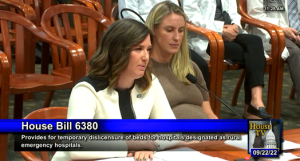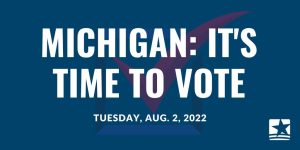
The Legislature returned the week of Sept.19 to continue work on several pieces of legislation that the MHA is currently monitoring. Committees met in both the House and Senate, taking up legislation that included several new bills supported by the MHA in the areas of behavioral health, rural emergency hospitals, speech-language pathologist licensure and telemedicine.
 In the House Health Policy Committee, initial testimony was taken on new legislation to make changes to the preadmission screening process for behavioral health patients. House Bill (HB 6355), introduced by Rep. Graham Filler (R-St. Johns) and supported by the MHA, would memorialize the requirement for preadmission screening units operated by the Community Mental Health (CMH) services program to provide a mental health assessment within three hours of being notified by a hospital of the patient’s need. If a preadmission screening unit is unable to perform the assessment within the three-hour time frame, HB 6355 would also allow for a clinically qualified individual at a hospital who is available to perform the required assessment.
In the House Health Policy Committee, initial testimony was taken on new legislation to make changes to the preadmission screening process for behavioral health patients. House Bill (HB 6355), introduced by Rep. Graham Filler (R-St. Johns) and supported by the MHA, would memorialize the requirement for preadmission screening units operated by the Community Mental Health (CMH) services program to provide a mental health assessment within three hours of being notified by a hospital of the patient’s need. If a preadmission screening unit is unable to perform the assessment within the three-hour time frame, HB 6355 would also allow for a clinically qualified individual at a hospital who is available to perform the required assessment.

Kathy Dollard, psychologist and director of behavioral health for MyMichigan Health, joined the committee to testify in support of HB 6355. “Strengthening our behavioral health system includes strengthening our behavioral health workforce and that can start with creative solutions like providing clinically qualified hospital personnel the ability to conduct pre-admission screenings,” said Dollard. No votes were held on HB 6355 at this initial hearing.
MHA staff also provided testimony during committee on HB 6380. Introduced by Rep. Andrew Fink (R-Hillsdale), HB 6380 would make the necessary changes to state law to allow for Michigan hospitals to pursue a new federal designation of “Rural Emergency Hospital” (REH) status. A REH designation comes with significant requirements such as limiting total beds to 50, maintaining an average length of stay of 24 hours or less and a required transfer agreement with a level I or II trauma center. Hospitals that choose to convert to a REH will receive enhanced federal reimbursement to provide critical emergency and outpatient services, especially in geographic areas.

Lauren LaPine, director of small and rural hospital programs, MHA, and Elizabeth Kutter, senior director of advocacy, MHA, testified in support of the legislation. “HB 6380 provides rural hospitals in our state with the ability to continue providing care in our most rural communities,” said LaPine. No votes were taken on HB 6380.
Initial testimony on two bills that were previously reviewed by MHA’s Legislative Policy Panel also occurred during committee. Senate Bill (SB) 811, introduced by Sen. Curt VanderWall (R-Ludington), would extend the length of time for an individual to complete a temporary Speech-Language Pathologist license and extend the length of time those temporary licenses are valid. The MHA is supportive of SB 811, which did not see any votes this week.
House committee members also took initial testimony on SB 450, which would ensure that visitors of cognitively impaired patients are permitted in healthcare facilities. Introduced by Sen. Jim Stamas (R-Midland), the bill would prohibit the director of the Michigan Department of Health and Human Services (MDHHS) or a local health officer from issuing an order that prohibits a patient representative from visiting a cognitively impaired individual in a healthcare facility. As written, the legislation does not prevent a healthcare facility from implementing reasonable safety measures for visitors and will still allow for facilities to limit the number of representatives per patient. The MHA is neutral on the bill and will continue to monitor any action taken.
The Senate Health and Human Services Committee took initial testimony on SB 1135, which was introduced by Sen. Mike MacDonald (R-Macomb Township). SB 1135 would specify that previous expansions to Medicaid telemedicine coverage also apply to the Healthy Michigan Program and Michigan’s medical assistance program. Most notably, the legislation would require continued coverage for audio-only telemedicine services. The MHA is supportive of SB 1135, which would continue virtual care policies that have proved to be effective and safe during the COVID-19 pandemic.
In the Senate’s Regulatory Reform Committee, testimony was taken on another MHA-supported bill to regulate the sale of kratom in Michigan. Kratom is a substance of concern with opiate-like effects that has no approved medical use in the United States. HB 5477, introduced by Rep. Lori Stone (D-Warren), would create a license for kratom sales and manufacturing, require testing of products and require new safety warnings on kratom substances sold in Michigan. While the MHA prefers a federal Schedule I ban of the drug, the association is supportive of HB 5477, which will help limit adolescent addiction and prevent adulterated products from being on the market.
Members with questions on these bills or any other state legislation should contact Adam Carlson at the MHA.




